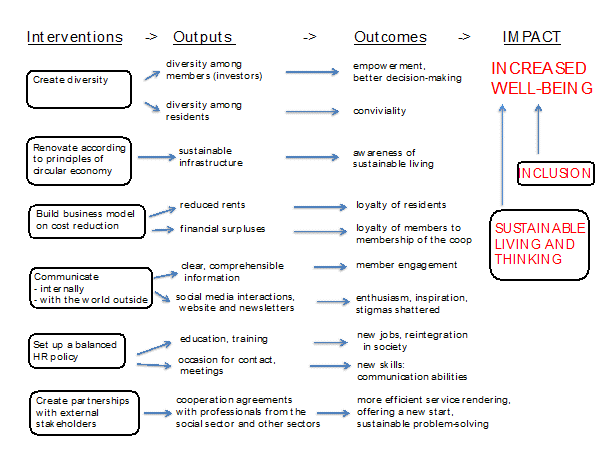The aim of the cooperative is to move towards an inclusive society where sustainability is central. This type of society improves housing and thus general well-being.
In its day-to-day policy, in its board of directors and generally in its relations with individuals and organisations, the cooperative emphasises four core values: diversity, continuity, autonomy, transparency.
Diversity
After Dubai, the Brussels-Capital Region has the highest diversity rate in the world. This fact is used in a positive way in the cooperation project. The more people come from different backgrounds, the more varied the perspectives, and the more likely it is that new information will be provided or a better alternative will be offered.
As all members of a cooperative have an equal right to speak, debate and decide, they feel that they are taken seriously and are motivated to contribute. Empowerment is promoted.
Continuity
The concept of continuity goes beyond environmental sustainability, where current generations take care of the environment in a way that does not burden future generations. Continuity refers to the circular economy, which is about re-organising, re-using, re-purposing and deploying unused resources more efficiently. Applied to real estate, it means that buildings are re-used, renovated or re-purposed.
Autonomy
The cooperative project came about because government policy is lagging behind and market mechanisms in the real estate sector are not functioning optimally. By taking matters into its own hands and setting up an efficient service, democratically controlled by its members, the cooperative acts autonomously and independently.
For the cooperative to remain autonomous in the long term, the business model must be financially viable. Sound financial management creates loyalty; it motivates cooperators to maintain their membership. Real estate investments require a large initial capital outlay, as well as intermediate investments for maintenance, renewal and replacement over time. The deliberate decision to pay a rather modest dividend each year allows the cooperative to retain sufficient funds to build up reserves for future investments. All stakeholders in the cooperative share in the profits.
Profit has a broad meaning: it can be financial returns, cost reductions or non-financial gains in terms of quality of life or well-being. For example, the system of price differentiation allows some residents to access quality housing that they could not afford elsewhere.
Read more about the economic model and about price differentiation
Transparency
In order to finance its real estate projects, the cooperative issues shares. The price of a share will be deliberately kept low to encourage people with smaller investment budgets to become cooperators. The group of large and small investors will therefore potentially include many people. The challenge for the cooperative is to maintain good contacts with all members and to involve them as much as possible in the activities. Transparency about its operations is essential. The cooperative aims to disseminate information regularly in a clear and understandable way. Impact measurements will be carried out on a regular basis to monitor progress in the areas of inclusion and sustainability. The results of these assessments will be shared with all stakeholders.

Source: "Operation LINC: on the cooperative approach to housing crises", thesis submitted by Danielle Borremans, June 2019, in the framework of the Postgraduate in Cooperative Entrepreneurship and Management/ KU Leuven.
Based on "Impact Wizard", tool developed by Sociale Innovatiefabriek, meant to make social impact visible. https://www.socialeinnovatiefabriek.be/nl/english

